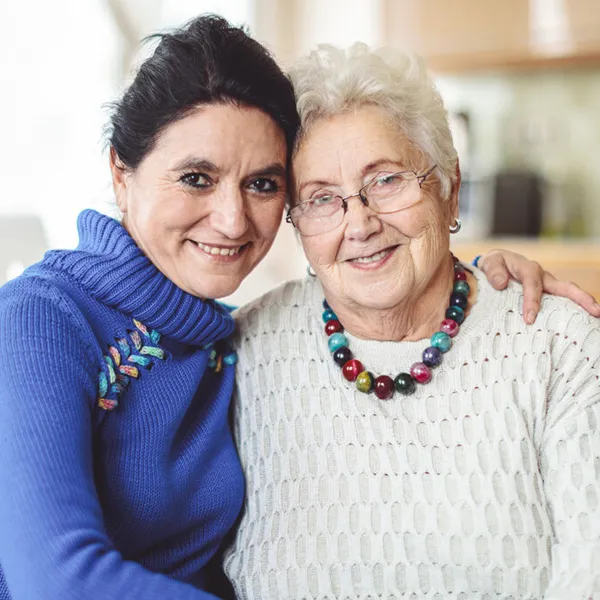
Your Gift Can Make 2x the Impact
Your Gift Can Make 2x the Impact
A gift can go twice as far during our February $100,000 2x Match. Your contribution by Feb. 27 will fuel Alzheimer’s research and help provide essential care and support.
Donate NowDr. Ross Paterson Shares His Research Funded by Alzheimer's Association Part the Cloud Grant
Clinical cognitive neurologist and biomarker researcher Dr. Ross Paterson is principal research fellow and honorary consultant neurologist at University College London. Read our Q&A to learn about his grant funded by Part the Cloud, which accelerates scientific progress in Alzheimer's research by funding the most promising early phase studies.
Dr. Paterson, how does your personal connection to Alzheimer’s tie to your work?
As a medical student, I had a great interest in the biology of Alzheimer's because of my grandmother, who had the disease. While I was at university, I lived with her. As one of her caregivers, I had quite an incentive to get involved in neurology and then subsequently Alzheimer's research.
I’ve always been interested in understanding disease mechanisms, and dementia is certainly an interesting puzzle. When I first started learning about Alzheimer’s, I realized that the boundaries of knowledge were stark when compared to other diseases. I especially realized the need for better therapies. My main desire was to get involved to make a meaningful difference.
Tell us about your Part the Cloud grant.
My latest study involves protein clearance and finding a treatment that would stop tau production. [Tau is a protein that primarily helps support nerve cell structure and transport nutrients within brain cells. In Alzheimer’s disease, tau becomes modified, forming clumps (known as “tangles”) within the brain.]
As a Part of Cloud award recipient, my grant is allowing me to run a clinical trial using an antisense oligonucleotide (ASO), an approach which uses small fragments of DNA that target specific genes in the cell. In this case, ASOs target MAPT, which interrupts the creation of tau, and is expected to reduce the amount of tau protein in the brain.
We use a technique known as stable isotope labeling kinetics (SILK) to measure to what extent we're reducing the production of tau in the human brain. Since tau has an important role in an individual’s brain, it cannot be switched off completely. SILK is used to prevent safety implications associated with tau treatments. The technique can be easily administered and has been used in over 300 patients.
My Phase 1b clinical trial “Capturing tau kinetics in a clinical trial of ASO NI0752 in Alzheimer's” will evaluate safety, tolerability and dose of a novel compound aimed to reduce dementia-related tau production in people with Alzheimer’s. If successful, our study will help identify a novel drug therapy method safely targeting tau.
Founded in 2012 by Michaela "Mikey" Hoag, Part the Cloud is a movement to accelerate scientific progress in Alzheimer's research by funding the most promising early phase studies. Part the Cloud is funding 60 projects across the globe.
How has Part the Cloud accelerated your research?
Part the Cloud has placed confidence in my team and our work as the movement continues to support high-risk, high-reward research. The responsiveness to ambitious questions has been really impressive. On a personal level, the Alzheimer’s Association has placed its trust in me at a time that's really important for my research as a clinical scientist, which I am grateful for.
It is my hope that we will have a meaningful outcome for patient safety and accelerate the clinical trials of tau therapy through the work done with the Part the Cloud grant. It will have relevance both for the study and also provide critical information for future studies that use biomarkers as an outcome measure.
Why is now an exciting time to be working in Alzheimer's research?
It's a hugely exciting time to be in Alzheimer's disease therapeutics specifically. Researchers have got some fantastic tools to be able to measure whether we are engaging with biological pathways the way we need to be.
The Alzheimer’s and dementia research community is in a very good place. As we continue to move research forward and give patients access to novel therapies, I look forward to the opportunities to slow disease progression in the future.
 About: Originally from Scotland and based in London, Dr. Ross Paterson studied and trained in Glasgow, London, Brussels and San Francisco. As a clinical cognitive neurologist and biomarker researcher, Dr. Paterson’s research focuses on younger-onset Alzheimer's disease, rapid progressive dementias, and studies of proteins involved with dementias. In addition to his Alzheimer’s Association Clinician Scientist Fellowship (AACSF) and Part the Cloud grant, his work is supported by the UK Dementia Research Institute and the Queen Square BRC. He also receives funding through his role as co-lead of the Neurofilament Light consortium.
About: Originally from Scotland and based in London, Dr. Ross Paterson studied and trained in Glasgow, London, Brussels and San Francisco. As a clinical cognitive neurologist and biomarker researcher, Dr. Paterson’s research focuses on younger-onset Alzheimer's disease, rapid progressive dementias, and studies of proteins involved with dementias. In addition to his Alzheimer’s Association Clinician Scientist Fellowship (AACSF) and Part the Cloud grant, his work is supported by the UK Dementia Research Institute and the Queen Square BRC. He also receives funding through his role as co-lead of the Neurofilament Light consortium.
Outside of his professional work, Ross is fascinated by old cars, paintings and antiques. Watch his YouTube series, “Cars and scientists,” where he marries his love for classic cars with scientific curiosity.
Related Articles
Part the Cloud
Research

The first survivor of Alzheimer's is out there, but we won't get there without you.
Donate Now
Learn how Alzheimer’s disease affects the brain.
Take the Brain Tour
